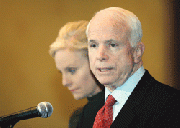John McCain treads dangerous ground as he defends himself against charges that he may have maintained an inappropriate relationship with a special-interest lobbyist, and that he may have done so with an individual who influenced his actions as a key player on the Senate Commerce Committee on matters involving communications policy.

If McCain had no relationship with the woman in question — telecommunications lobbyist Vicki Iseman — and was not in any way influenced by her, then he has been treated unfairly by The New York Times, which clearly has suggested that wrongdoing has occurred.
On the other hand, if McCain’s carefully-worded denials of impropriety are attempts to deceive the American people about his wrongdoing — not in his personal life but in his capacity as a senator who swore an oath to “well and faithfully discharge the duties of the office” — then he is and should be finished politically.
Make no mistake, the shaping of public policies to satisfy a “friend” who is in the employ of an individual who will benefit from that manipulation is the classic example of a failure to “well and faithfully discharge the duties of the office.”
And, make no further mistake, any violation of the oath ought to disqualify McCain from consideration for the presidency.
Who says? John McCain.
When the Arizona senator voted in 1999 to convict Bill Clinton following the former president’s impeachment, he said that he was doing so because he was “persuaded that the President has violated his oath of office.”
“All of my life, I have been instructed never to swear an oath to my country in vain. In my former profession, those who violated their sworn oath were punished severely and considered outcasts from our society,” McCain told the Senate in February, 1999. “I do not hold the President to the same standard that I hold military officers to. I hold him to a higher standard. Although I may admit to failures in my private life, I have at all times, and to the best of my ability, kept faith with every oath I have ever sworn to this country. I have known some men who kept that faith at the cost of their lives. I cannot — not in deference to public opinion, or for political considerations, or for the sake of comity and friendship — I cannot agree to expect less from the President.”
McCain’s statement on the Clinton impeachment provides an ideal standard for application to the senator’s current circumstance.

“But are these articles of impeachment of sufficient gravity to warrant removal or can we seek their redress by some other means short of removing the President from office?” McCain asked the Senate. “Some of those who argue for a lesser sanction, including the President’s able counsel, contend that irrespective of the President’s guilt or innocence, neither of the articles charge him with high crimes and misdemeanors. Nothing less than an assault on the integrity of our constitutional government rises to that level. The President’s offenses were committed to cover up private not public misconduct. Therefore, if he thwarted justice he did so for the perfectly understandable and forgivable purpose of keeping hidden an embarrassing personal shortcoming that, were it discovered, would harm only his family and his reputation, but would not impair our system of government.
“This, too, is an appealing rationalization for acquittal,” McCain continued. “But it is just that, a rationalization. Nowhere in the Constitution or in the expressed views of our founders are crimes intended to conceal the President’s character flaws distinguished from crimes intended to subvert democracy.”
That’s tough talk, to be sure. But McCain made himself clear.
“I do not desire to sit in judgment of the President’s private misconduct. It is truly a matter for him and his family to resolve,” the senator said. “I sincerely wish circumstances had allowed the President to keep his personal life private. I have done things in my private life that I am not proud of. I suspect many of us have. But we are not asked to judge the President’s character flaws. We are asked to judge whether the President, who swore an oath to faithfully execute his office, deliberately subverted — for whatever purpose — the rule of law.”
Using a senate seat to manipulate policies and the debate to favor the client of a “friend” who happens to be a telecommunications lobbyist is such a subversion. If McCain did what is alleged, he should apply to himself, as a candidate for the presidency, the same hard line that he applied to a president back in 1999.
John Nichols is Washington correspondent for The Nation magazine.






Leave a Reply